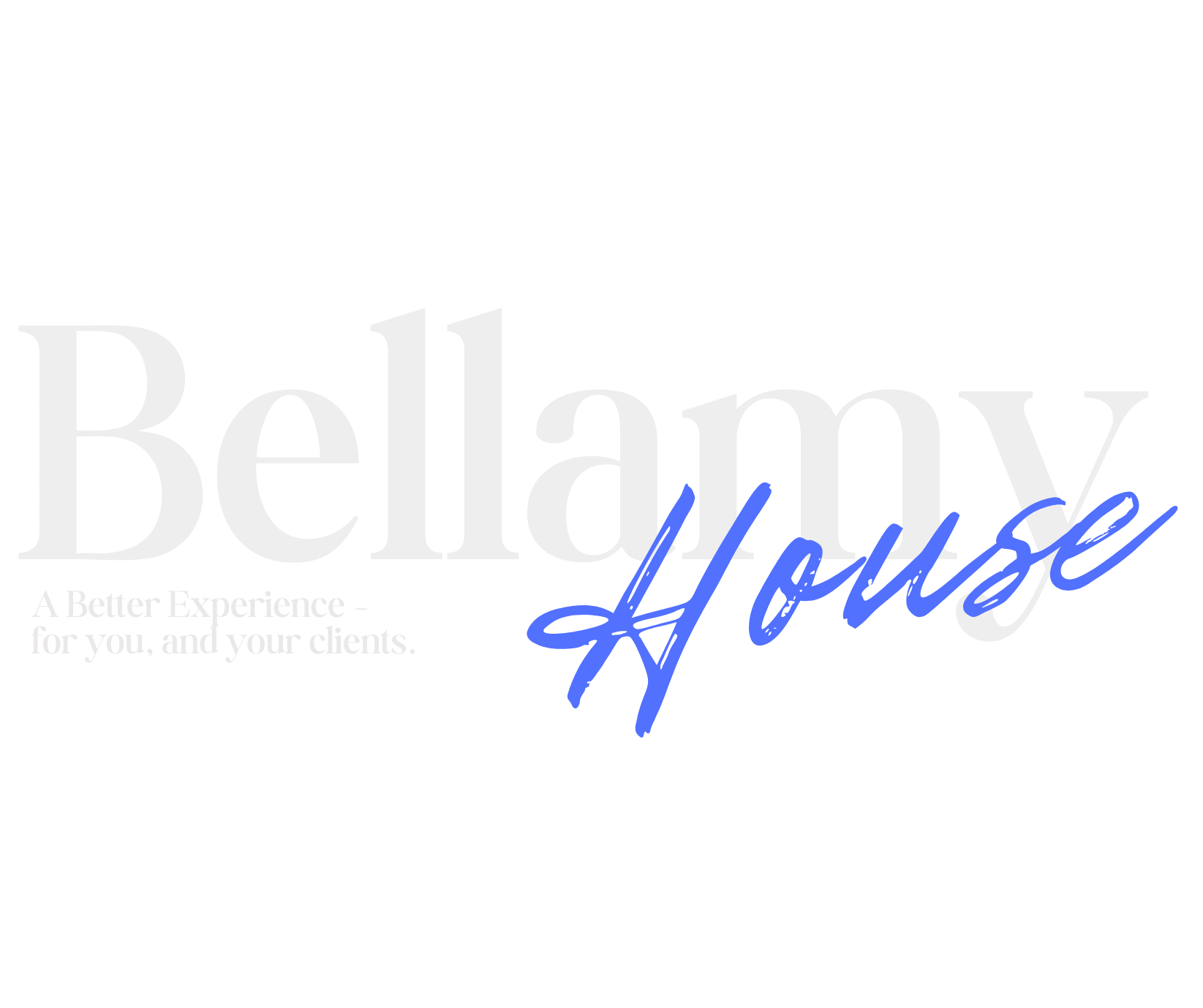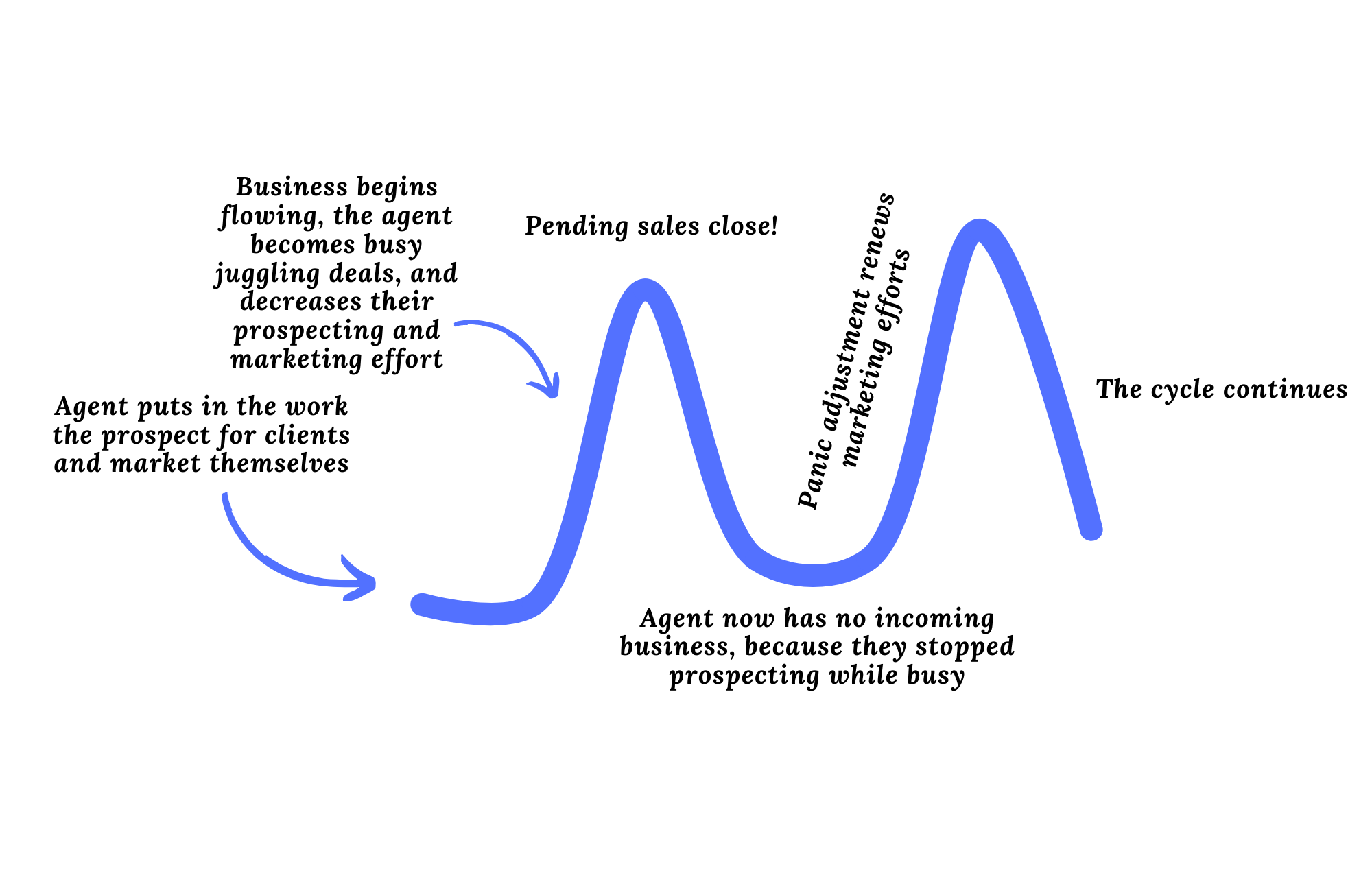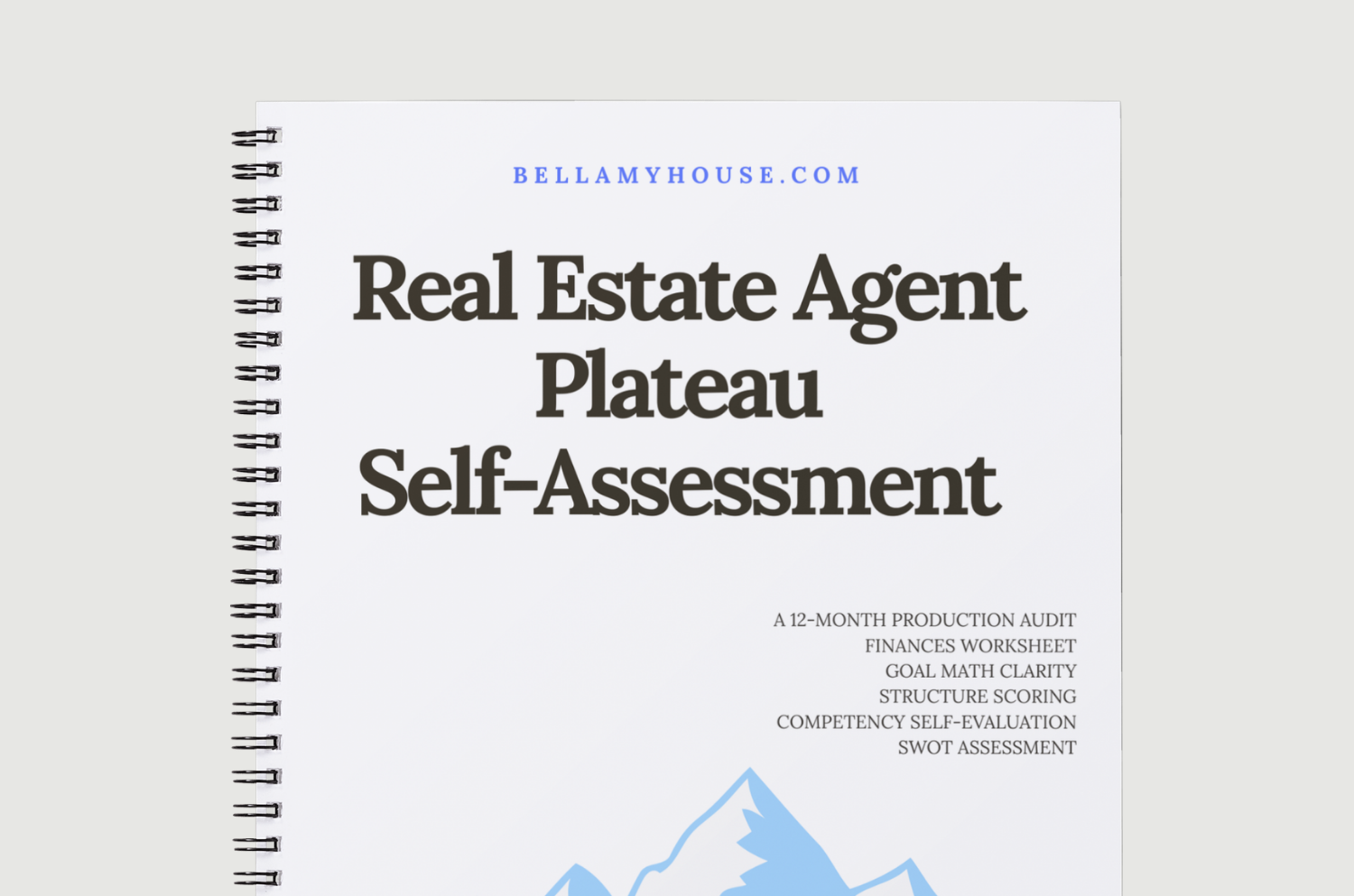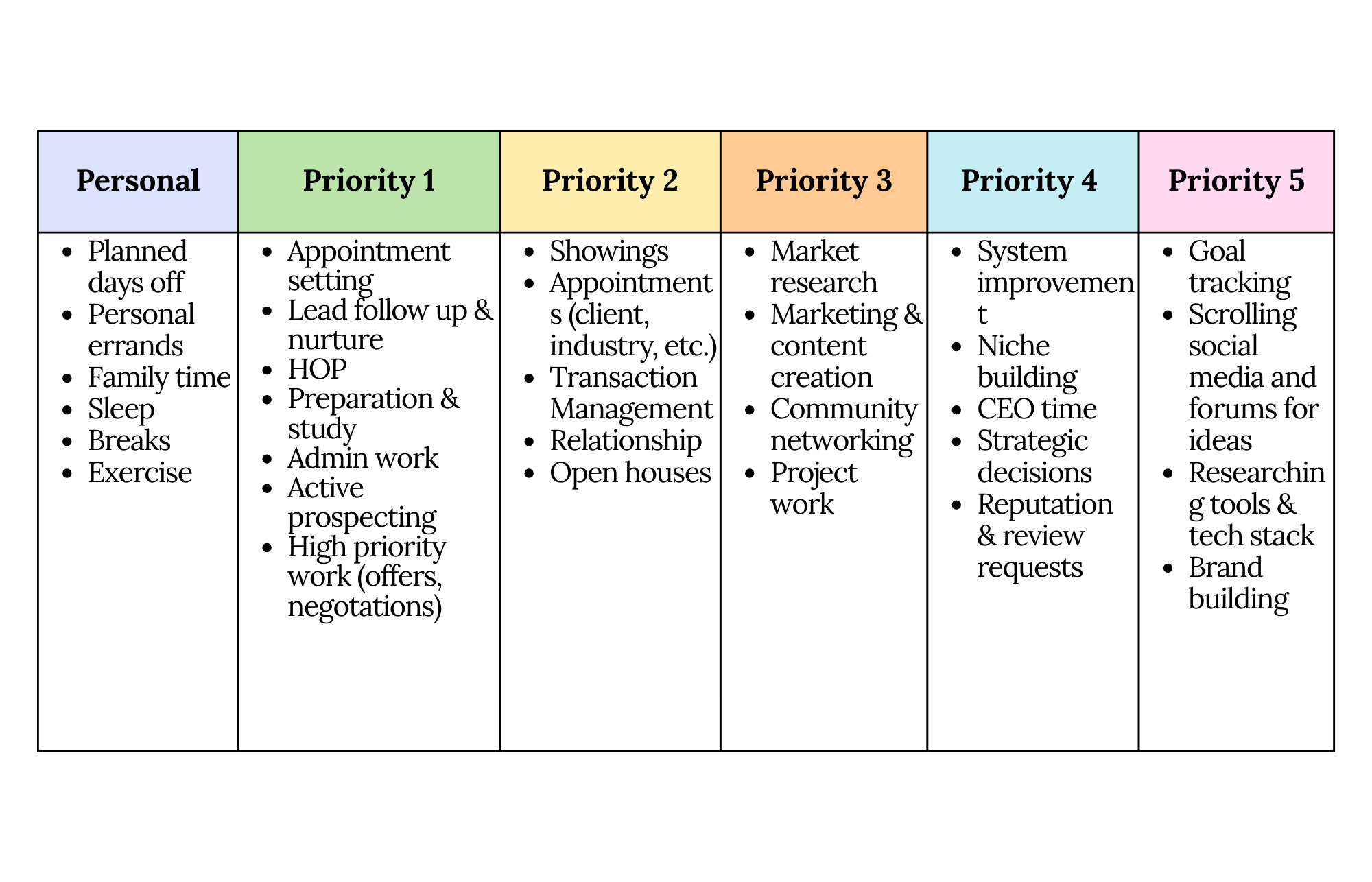How to Make $100k in Your First Year In Real Estate: A How-To Guide From Someone Who Did It
“It's hard to beat a person who never gives up.”
― George Herman Ruth
There is a reason that 60% of Realtors quit in their first year—it is not an easy job. You're "on" 24/7. If you stop hustling, then the money stops too. You'll meet a lot of weirdos and jerks, like, a lot of them—more than you probably realize are out there. And no matter how smoothly you think something is going, someone will always be ready to throw chaos onto the tracks.
The paperwork can be intense. You could even lose money on a sale, especially early on (happened to me in year 1, -$300 for months of work). People will be mad at you for things you had nothing to do with. You'll learn why real estate agents don't always have the best reputation–newsflash, many of them are terrible. I have a blacklist notes tab on my phone, so I never forget the particularly heinous ones.
Still here? Let's consider the positives—why this can be one of the best jobs in the world, if you can handle it. You may work a lot, but it's on your terms. I have assisted my clients from hotels all over the world. You need to hustle for your money, but the income ceiling is limitless. You'll meet some truly fantastic people and make a real difference in their lives and futures. You can scale to any level you'd like–you just want to serve your hometown? Great! Want to build a team that assists several states? You can do that too.
$100k in your first year is a lofty goal. Tricky? Yes, for sure. Impossible? Nope, I'm living proof. If you have grit, are willing to make a plan, and put yourself out there, then this goal is entirely doable.
You don't need a sales background or a huge pool of connections. I started directly out of college, without a single friend who was anywhere near ready to buy a house. And while my friends and family were supportive, nobody was eager to entrust a newbie with such a monumental life decision. I had to prove myself first.
The following list details the steps you'll need to take if you want to make $100k in your first year in real estate. From now on, no more asking yourself, "Can I make $100k in my first year in real estate?". Start telling yourself you can, and that you will.
A few tips before we get to the list:
- Join an excellent brokerage. You are looking for a brokerage with a large market share in your area. You are looking for a brokerage with a mix of new agents and successful, established ones. You are looking for a brokerage that has a system to provide leads (even if they come with a referral fee price tag). Boutique brokerages can be excellent, but rarely will they have the resources to propel a new agent into "overnight" success. Pick a brokerage with a physical location near you that is used regularly by other agents. There are great things about the "online-only" brokerage model, but you'll likely struggle as a new agent in that environment unless you are extremely confident and extroverted.
- Be prepared to do this full-time. You will never reach this income goal working part-time. If you need a second job to get by while you get the ball rolling, that's fine, but be prepared to dedicate a minimum of 40 hours a week to building your real estate career.
- You'll need some cash to get started, so use it sparingly. It's tempting to start ordering collateral left and right. Signs, business cards, digital ad spend–you are not ready for most of this. Get yourself a good set of business cards, a quality printer (unless your office has one), and a CANVA account. Otherwise, order items as you need them.
- Realize that something is better than nothing. I encourage you to check every box on the following list, but if you can't, know that doing something is better than nothing. There are items on this list that I struggled intensely with in my first year, which now come extremely easily. Progress takes time, so be patient with yourself.
- Decide how you want to operate. Will you work individually, or join a team? I am partial to the individual route. A team is temping–guidance, instant leads–if you've found a good, small team that can dedicate time to you, then great. If not, you're likely better off hustling for yourself than lining someone else's pockets with your time and energy. On that note, you do not need a transaction coordinator or an assistant when you get started. Learn how to do all the paperwork and planning yourself, knowing these steps will benefit you and your clients for the rest of your career. One day, you can hire help, but for now, you need to learn.
Build a Business Plan
First things first, you're going to build yourself a business plan, and then you are going to review it weekly. Quarterly, you'll make any needed adjustments to your action steps. It may not be a bad idea to set a continuous time in your schedule to do this; consider time blocking it into your week.
“When it is obvious that the goals cannot be reached, don’t adjust the goals, adjust the action steps.” – Confucius
There are endless ways to do a business plan. I recommend keeping this one simple. Here are your tasks for your first business plan.
- Set your monetary goal, and use data to back it up.
- Let's work through a quick example. You want to make $100k in your first year. Let's say you have a brokerage split of 70/30. Let's estimate that you will average 2.5% commission on each sale–ask your broker what to expect for your area. Log onto your MLS and do some market research–let's say the average sales price in your area is $500,000. But you're new, and will likely begin with lower-priced sales, so your goal is for an average sales price of $400,000.
- 2.5% of $400,000 is $10,000. Now, your 70/30 split comes in, so you get to keep $7,000.
- $100k divided by $7,000 is 14 (rounded). Congratulations! You now know that to hit your goal, you'll need to sell 14 homes this year/have a sales volume of $5.6m.
- There are other factors, too—how much will you pay out in referrals if another agent or your brokerage hands you a client? The going rate is 20-35% per sale. How many of your sales will you pay that fee on? 10% of them? 50%? You can estimate that now, or keep things simple to start.
- Set your 1-year, 5-year, and 10-year goals. These will change down the road, but it will help you today to envision farther out than the 1-year mark.
- For Example: "In 1 year, I will have a dedicated website, an organized CRM with 100+ contacts, and I will have made $100K. In 5 years, I will have an assistant helping me manage my sales, I will consistently make $150k+ per year, and I will have my own office space. In 10 years, I will have my broker license and have a team of 5 other agents working for me." Aim for something like that, and keep the closer goals more detailed.
- Start the initial outline of a brand for yourself. Your brand is more than just your logo or your color scheme. It is how you present yourself professionally and to your clients. It is your voice—the way you interact and the way your written word comes across. You are aiming to one day have a consistent brand that is undeniably you.
- For now, craft yourself a mission statement and value proposition.
- Don't worry about a logo yet. If you have one, great. I did not develop my own logo until year 3, and I would not change a thing. Lean on your brokerage's logo for now; it has better face recognition than you do, anyway.
- Brainstorm a few ways you think you'd like your brand to one day become. "Personable, warm, and friendly. I want clients to know they can trust and rely on me." Or, "Modern, efficient and professional. I lead with knowledge and precision and will become the go-to expert."
- Choose your "spinning plates". From now on, consider the routine activities that you implement to find clients to be your "spinning plates". Right now, you're aiming for 3-6. Too few, and you won't attract much of a crowd. Too many, and you're doomed to drop them all. We'll talk more about what your spinning plates should be later on, but make sure they become part of your business plan. A quick example, "my spinning plates will be my robust social media presence, assisting other agents in my office, doorkocking and farming my neighborhood, and my brokerage's lead referral program."
- What are your spinning plates? Detail them.
- How often will you attend to them? Are these daily tasks? Weekly? Quarterly?
- Approximately how much business are you ideally hoping to get from them? A rough goal will do.
- Begin thinking of your "niche". While it's far too early to lock yourself into any sales niche, you should begin thinking of what you would like yours to one day be. This will help you to angle your marketing and prospecting efforts in the direction you want to go. First-time home-buyers? Investors? Your hometown? Retirees? Write down your thoughts and begin to brainstorm ways you may align with that audience.
That is all you need for your first business plan. Right now, it is intended to be a tool–guidance and motivation. One day, you'll need a fully formed, lengthy plan, but for now, this is perfect. You're already well ahead of the competition.
Bellamy House offers the Ultimate Playbook for Beginner Real Estate Agents, guided coaching, templates, tasks, and education to succeed.
Get A Coach/Mentor
As far as this article is concerned (I.E., This Author), this task is non-negotiable. Having an amazing coach is one of the main reasons that I have been able to succeed. I truly do not know if I would have been able to establish myself in this industry without my coach. Outside of Real Estate, my coach has been a true friend, invaluable asset, and confidant in all aspects of my life.
“My job is not to be easy on people. My job is to take these great people we have and to push them and make them even better.” – Steve Jobs
I was lucky. I joined a brokerage where my office's manager/broker was also a highly qualified and experienced real estate coach. However, this certainly highlights the need for you to join an excellent brokerage.
On paper, here is what you can expect from a coach.
- Provides accountability to follow through on your goals
- Offers a perspective you can’t always see from inside your own business or experience level
- Helps you identify blind spots and bad habits
- Structures your learning curve to avoid wasted time and energy (You don't know what you don't know!)
- Recommends tools, systems, and strategies
- Challenges your thinking and pushes you beyond your comfort zone
- Acts as a sounding board for ideas, decisions, and setbacks
- Helps you build confidence and clarity in your direction
- Keeps you focused on high-impact activities instead of busywork
- Provides emotional support during tough moments
- Shares industry insights, scripts, templates, playbooks–and much more.
Seriously, you need to get a coach—or, at the very least, an experienced mentor who will meet with you regularly.
- Your Broker or Office Manager
Most brokerages offer in-house training, mentorship programs, or at least someone who’s willing to answer questions. Start here—it’s included for a reason. - Experienced Agents in Your Office
Find someone you respect and offer to help—showings, open houses, anything. In exchange, you’ll get a front-row seat to how they work and think. It’s one of the best ways to learn. You could also ask if they are willing to mentor you more formally. - Local Real Estate Facebook Groups / Online Forums
There are often agents or newer coaches offering group support, accountability pods, or mentorship relationships at little to no cost. Just watch out for people who are all talk, no quality content. - Coaching Services or Programs
There are plenty out there — but don’t drop thousands right away. Look for someone who caters to new agents and your current level. You should NOT be spending big bucks on coaching before you have mastered selling a home.
We offer New Agent Coaching here at Bellamy House—but seriously, if your brokerage offers quality mentorship for free, DO THAT! See Our Coaching Page.
Ingratiate Yourself With The Agents In Your Brokerage
You can start with an email. Most brokerages let you email all your fellow agents in one fell swoop.
"Hi, my name is Bella Haus, I am a brand new full-time agent here, and I am extremely eager to learn. If you need absolutely any assistance (showings, open houses, inspections – anything!) I would be happy to help you..."
If your brokerage has multiple office locations, opt to time block into your schedule appointments to visit at least one office per week. Find a place to work, set up shop, and start introducing yourself to the agents and managers who work there. [Note: This is for offices that are part of your specific brokerage. Don't do this at random, other brokerages.]
After you've met another agent, chatted, just said hi–add them to your CRM (next task), and send them an email.
"Hey! It was so great to meet you at the Washington Office today! If you ever need any assistance, please keep me in mind..."
Successful people often want to help others be successful as well. Read that again. Some of the most generous help I ever received came from other, highly successful agents in my brokerage, simply because they wanted to see me succeed too.
Working with other agents as you build your career will work for you on several levels.
- Learning. Even years into this industry, I still learn something new every sale. The Real Estate Licensing course does very little (see: nothing) to prepare you for the day-to-day of this career. You will need to learn from others who have come before you. Tap into their knowledge and make it your own.
- Connections & Opportunities: Remember what I just told you? Successful people often want to help others be successful. It may take time, but eventually, you are likely to encounter opportunities by aligning yourself with other agents. Just don't let anyone take advantage of your time. Distinguish learning and building connections from running in circles.
Here are a few other ways to connect with the agents around you...
- Attend your brokerage’s office meetings and trainings regularly
Show up, contribute, and stay a few minutes after to chat. - Offer to assist busy agents
Help with open houses, showings, or admin work—it builds trust and experience fast. - Send DMs or emails to agents you admire
Keep it short and respectful: "I’m new and love how you [do X]. If you're ever open to letting me buy you lunch and pick your brain, I’d be grateful." - Attend local networking events
Even if it’s not real estate-specific, getting in the room matters. - Reach out after transactions
If you’re co-broking with someone great, follow up after closing to say thanks and stay in touch. Send a short handwritten letter! - Comment meaningfully on other agents’ social posts
Build relationships by engaging consistently — not just liking and scrolling. - Ask your mentor or broker to introduce you to agents who match your style
You don’t need to do it alone—a warm intro goes a long way.
Show Up. Every. Single. Time.
"Do the best you can until you know better. Then when you know better, do better." - Maya Angelou
You don't need to drive a fancy car or wear a Rolex. You don't need to look perfect every day or wear a three-piece suit to the office—but you do need to consistently and noticably establish yourself as a professional. Take a moment and consider what that means for your business and your brand.
This career, like most, is built upon your reputation. To wildly succeed in your first year, there are several points to your reputation that you must establish.
- You are a professional. You look, act, and speak like one.
- You are never late. You arrive precisely when you say you will.
- You make no excuses. You do precisely what you say you will.
If you can cement those 3 items into your reputation now, you will already be miles ahead of your competition.
In my first year, I wore a blazer or suit jacket every time I went to the office or on an appointment. Period. My colleagues, managers, and clients never saw me in anything less professional than a blazer. Company BBQ? Doesn't matter, suit jacket. They never saw me in jeans, leggings, or sneakers.
As years went on, this relaxed slightly. My clients may now see me in jeans and a nice blouse or sweater. I am known to run into the office in my athletic wear to print something on a day off. This doesn't matter. I established early in my career through reputation that I am a professional, and then built a brand that allows me to dress more relaxed down the road.
In your first few years in Real Estate, you do not have that luxury. So, arrive early, dress well, and never miss a commitment–and remember, you're building something.
“You can't build a reputation on what you are going to do.”
― Henry Ford
The Spinning Plates
As referenced earlier in this article, your Spinning Plates are the routine activities that you implement to find clients. You want a strong balance with 3-6 of these items. It's perfectly fine to adjust them as time goes on, or start with less and pick up more. Let's look at some excellent options for a new agent...
- Sphere of Influence (SOI) outreach
Texts, calls, coffee meetups, and DMs—stay top of mind with people who already know you. - Open house networking
Host your own or offer to cover for busy agents. Meet buyers and potential sellers in the neighborhood. - Social media content
Post value-driven, personal, or educational content consistently. Visibility = credibility. - Agent-to-agent referrals
Build relationships with other agents. - Brokerage referral programs
Tap into any lead-gen or relocation referral networks offered by your brokerage. These are often underutilized and gold for steady incoming leads. - Community events / local networking
Attend or sponsor events. Bonus if they're niche or aligned with your personality/interests. - Email newsletter
Send regular updates, tips, or behind-the-scenes info — even to a small list. It builds trust over time. - Lead follow-up system
Keep warm leads on rotation. No dead ends. - Door knocking or local mailers (geo farming)
Especially in your own neighborhood or near recent listings. - Online lead platforms (if used)
Zillow, Facebook ads, or referral platforms—but only if you have a fast follow-up process in place. - Strategic partnerships
Connect with lenders, attorneys, stagers, or small business owners. - Past client check-ins
Ask how they’re doing, not just if they’re ready to sell. Referrals often come from these conversations. - Educational events or webinars
Host a first-time buyer class or seller prep workshop—in-person or online. - Nurture your local reputation
Reply to local Facebook group threads, review local spots, and be visible in your market. - Host Expo Tables
Home shows, wedding shows—buy a table, come up with a prize for submitting an email, and network. - Cold Call
Calling expired listings, For Sale By Owners, those who live in the neighborhood you want to work in—there are endless lists to work from. - Host Office Uptime
This is a great way to prospect and learn the ropes, assuming you have an office with solid traffic.
Workshop your spinning plates with your broker or coach. You'll do best when you play to your strengths, but don't forget to push yourself and try new things. In my first year, I required a glass of wine to work up the nerve to cold call—now it's the easiest thing I'll do in a day, no wine needed.
These should be daily or weekly tasks, so make sure you have decided on their regularity, the steps to complete them, and build them into your schedule.
Start (and Maintain) A CRM
“I would like to see anyone, prophet, king, or God, convince a thousand cats to do the same thing at the same time.”
― Neil Gaiman
Your brokerage probably offers a decent, free CRM to use. I've used many over the course of my career—Follow Up Boss, KVCore, Sage, Pipedrive—they all have had their pros and cons.
Regardless of whether you decide to start simple or more robustly, your CRM is a critical component of your success. Frankly, you will never remember everyone that you meet; you need a place to store your contacts, to record when you last spoke to them, and to keep relevant notes.
If you're on a budget or just want to start small, feel free to use something as simple as Excel for your first CRM. Just make sure that it can be easily uploaded to transfer to a new platform, as you will likely someday want to upgrade.
Bellamy House offers a Free template for a simple starter Excel CRM, see here.

No Sale is Too Small, Every Client Deserves Your Full Attention
This next item is more advice than a task, but it was advice that was given to me at the start of my career, and I never forgot it.
Early on, you will likely focus on lower-priced sales, have a less favorable commission cap, and pay more $$$ in referral fees. It doesn't matter. Train yourself now that you will be just as grateful for the large sales as the small ones. It does not matter if your client is purchasing a small tract of land or their dream home—they are equally deserving of your time and attention.
You are building a business, and a successful business needs a strong base of raving fans to survive. So start creating your fans early, and make sure everyone who works with you has a reason to stick around.
Learn Your Scripts By Heart
There was a time when I would say my scripts aloud in the shower, in the car, while cleaning—anywhere, anytime, all the time. I'd memorize them, rehearse them, come up with new ones...repeat them nervously to my coach and butcher them under the pressure.
Scripts are not just for sales calls; they are for improving your knowledge and mindset so that you can represent yourself as the professional you are when you speak to clients, others in the industry, or future clients.
Scripts could be for welcoming guests to open houses and engaging them in conversation...
"Thanks so much for coming in today! Can I ask, did you find the open house online or did you see the signs driving by?... Are you on the open house circuit this weekend, or just checking out this one?"
They can also be for broaching difficult topics or objections, such as the dreaded conversation about commission...
"So, let me ask, how familiar are you with how the commission structure typically works? Have you been following the rule changes that NAR implemented last year?"
There are many ways to find scripts that will work for you; some may even be workshopped with your mentor or coach. Keep them organized, and dedicate serious, daily time to memorizing them.
Create Your Online Presence, Keep it Orderly
I can't tell you how many times I have looked up another agent, with the intention to refer them a client, only to find that they had not even bothered to write a half-decent bio for themselves on their brokerage's website. There is zero excuse for this, and lacking the most basic online presence is only hurting yourself.
Follow this checklist:
- You don't need a dedicated website now, but you must optimize the profile or site your brokerage provides:
- Add full contact information (email, phone, license number, service areas)
- Write a complete, professional bio.
- Upload a professional headshot
- Get a high-quality professional headshot—no selfies or cropped photos
- Create or update your LinkedIn profile.
- Choose at least one social media platform to show up on consistently (Instagram, Facebook, TikTok, etc.)
- Create a Google Business Profile (Google My Business):
- Add your contact info, photo, and brokerage name
- Use keywords for your service areas
- Start collecting reviews early
- Join and complete your profiles on real estate directories like Realtor.com and Zillow
- Update your email signature:
- Include your name, title, brokerage, phone, email, and links to your website or social media
- Record a professional voicemail greeting with your name, title, and a call-back promise
- Ask for reviews from clients, colleagues, or vendors you’ve worked with—and add them to your Google profile, Zillow, and social channels
- Maintain consistent branding across all platforms:
- Use the same headshot, tone, and name format
- Optional: Use one or two brand colors for highlights, backgrounds, or templates
Nine steps–there are only nine steps standing between you and making six figures as a successful Realtor. Nine key steps, which, when completed, will allow everything else to fall smoothly into place.
But here’s the truth: most agents won’t do them. They’ll skip steps, cut corners, or wait for business to find them. That’s not you. You’re building something real—something that lasts.
Follow these steps with intention, consistency, and urgency, and you won’t just survive your first year—you’ll stand out, gain momentum, and start building the kind of career others ask you how you pulled off.
Now get to work.
Did this help you? That was the public version. Subscribe for access to our Free Library—including checklists, templates, and everything else we wish we had in year one.
(No spam. No pressure. Just better tools.)
© 2025 Bellamy House. All rights reserved.
The resources, templates, and content provided are for educational and informational purposes only and do not constitute legal, financial, or business advice. Use of these materials does not guarantee specific results. By accessing this site and its materials, you agree not to reproduce, resell, or distribute any content without written permission.













